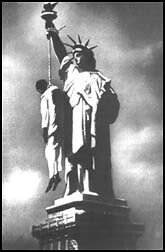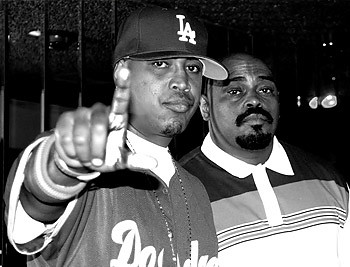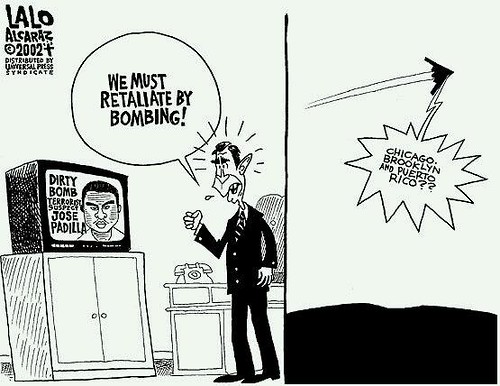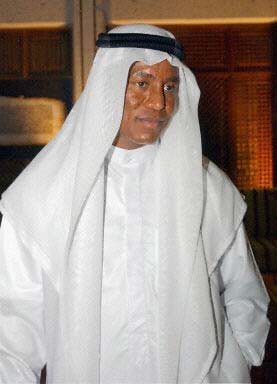The following interview is from the
Muslim Wake Up websiteLily Zakiyah Munir is a leading Indonesian Muslim human rights activist. She is the director of the Jakarta-based Centre for Pesantren and Democracy Studies that works with the ‘ulama and students of Indonesian Islamic boarding schools or pesantrens. In this interview speaks to Yoginder Sikand about her work and her vision of an Indonesian Islamic liberation theology.
Q: In recent years, particularly after the events of 11 September, 2001 and the rise of numerous anti-American Islamist groups in Indonesia, there is much talk about ‘liberal Islam’ flourishing in Indonesia. Some institutions seeking to promote ‘liberal Islam’ are now being liberally funded by certain conservative Western organizations, some of which are known for their close links with the American administration. How do you look at the ‘liberal Islam’ project that these groups seek to promote?
A: I share many liberal values myself, and of course I am opposed to extremism and narrow understandings of religion. My answer to your question would be that the liberal Islam project as it is developing in Indonesia today is not a homogenous one. It is characterized by considerable diversity and hence it is difficult to make generalizations about it.
My point is simple. If liberal Islam aims at protecting the rights of the poor and the marginalized then I welcome it. But if, as in the case of some foreign agencies that are now funding certain ‘liberal’ Islamic programmes in Indonesia, the underlying agenda is to create space for liberal free-market economics and the exploitation of our country by multinational corporations and dampen any critique of imperialism and neocolonialism, then I cannot agree with it. If it remains silent on the corruption of local and global elites and, instead, trains its ire only on the Islamist extremists, as is sometimes the case, I think this is a very one-sided approach. We have to be balanced in our critique. You cannot criticize and oppose only the radical Islamists while ignoring the oppression of the elites, Western imperialism and neocolonialism and the global system of capitalist exploitation.
Q: So would you say that the ‘liberal Islam’ project is largely an elitist venture?
A: In some ways, yes. Funding for such projects generally comes from Western agencies, and goes to Indonesian NGOs, which are mostly led by middle-class activists. This is not emerging as a spontaneous movement from among the marginalized. This elitism is also reflected in many of the causes that several ‘liberal Islam’ groups take up and the issues that they ignore. So, they usually focus on countering extremist Islamist groups and also take up issues such as gender, pluralism and democracy. I don’t say these issues are not important. Of course they are, but what is equally significant is that in the process other vital issues are, deliberately or otherwise, often left out, issues such as imperialism, unbridled capitalist exploitation, the World Bank-IMF-led form of ‘development’ that is only further widening inequalities and increasing poverty in Indonesia, and the growing influence of Christian fundamentalism globally and so on. And to add to this we have this terrible cultural in vasion coming in from the West, spreading crass consumerism and hedonism and mindlessly mimicking American pop culture, in the process destroying our rich local cultures. These are equally major challenges as is radical Islamism, but I find few advocates of ‘liberal Islam’ taking up these issues as well.
When they talk of democracy, it is limited generally to procedural or formal democracy—the one person one vote system of bourgeoise democracy—which, as we know, is not sufficient to bring about genuine economic and social democracy and social justice. This sort of formal democracy does not really challenge the established elites and the Western-dominated global system of exploitation. So, we need to talk about substantive democracy, democratic values such as social justice and protection of human rights from violation not only by radical Islamists but also by the state and by the dominant Western countries.
Another issue that I would like to draw your attention to is that some ‘liberal Islam’ groups that get funds from certain Western agencies seem to have bought into an elitist free-market discourse. For instance, the support given by some of them to the recent scrapping of the oil subsidy in Indonesia under World Bank-IMF pressure that has hit the poor the most.
So, this sort of ‘liberal Islamic’ discourse that is today being very vigorously promoted by certain conservative, even right-wing Western agencies in Indonesia, and perhaps elsewhere, too, is carefully tailored to suit the interests of the West and of local elites, because the poor hardly fit into their scheme of things. My own position is that yes, we need to be critical of Islamist extremists but we also need to simultaneously critique and oppose Western imperialism, Christian extremism and so on.
Q: So, what you are saying is that the basic agenda behind many Western agencies who are today sponsoring ‘liberal Islam’ projects in Indonesia is to stave off the challenge of anti-Western Islamist groups, and not to really bring about any structural changes?
A: Exactly. They certainly won’t sponsor any projects that might challenge free-market capitalism, multinational corporations that have such a stranglehold over the Indonesian economy or American hegemony! You won’t find them funding projects to critique hedonism and consumerism! Now, since it is unfortunately difficult for most Indonesian NGOs to get local funds, they generally rely on Western agencies that have their own agendas.
I think we really need to be careful that when taking foreign funds we don’t serve an anti-people agenda. It really is up to our own conscience how we use the money. There is always the danger that idealistic youth who really want to change the system and do something concrete for the poor might get co-opted, with access to foreign funds, trips abroad and foreign jaunts organized by NGOs funded by Western agencies. And once that happens it is rare for them to speak out against the structures that generate poverty and exploitation and the domination of loca l and global elites.
Q: In the writings and activities of certain Western-funded ‘liberal Islamic’ groups in Indonesia Islamist radicalism is seen simply as an ideological ‘deviation’ whose genesis is located in ‘deviant’ interpretations of Islam, rather than in concrete social structures. Do you agree?
A: Yes, I agree with you to a large extent. The issue of Islamist radicalism is often seen in a sociological vacuum, as if it comes out of nowhere. The fact, however, is that Islamist radicalism cannot be understood without situating it in the context of the broader political economy, and as resulting from certain local and global social, economic, cultural and political structures and processes of domination and exclusion. There can be no smoke without fire. So, unless these structures and processes are tackled, how can you expect radicalism to disappear?
Focusing only on the phenomenon of radicalism and ignoring its underlying structural causes will only exacerbate the problem and delay and further complicate its solution. Of course, dominant elites, both in Indonesia and in the West, do not want to recognize this as they themselves are deeply implicated in these structures that give rise to the phenomenon of radicalism as a reaction or response, and that is why you will find that many among them would insist that Islamist radicalism is a result simply a deviant understanding of Islam and that it has nothing to do with exploitation, predatory capitalism, western consumerist culture, or imperialism and so on. And then one must also remember that extremism and terrorism are not easily defined, and it all depends on who does the defining and why. So, one must ask, how and why does Saddam Hussain come to be defined as a ‘terrorist’, while America’s brutal invasion of Iraq and Afghanistan (where I just spent six months), which has resulted in the deaths of tens of thousands of innocent people, does not qualify to be called an act of terror?
Q: Being associated with several socially engaged Muslim groups in Indonesia how do you look at the question of interfaith relations?
A: My own understanding of Islam leads me to believe in the necessity of promoting interfaith dialogue and harmony. Several moderate Islamic groups in the country are actively involved in trying to promote better relations between Muslims and people of other faiths. Often, interfaith dialogue work takes the form of religious leaders meeting with each other and discussing their respective faiths and trying to discover their commonalities. Now, while that is important, I think the interfaith agenda needs to be broadened, so that people of different faiths, inspired by their own religions, can work together for common social goals, such as for social justice for all, or critiquing all forms of religious extremism or struggling together against the exploitation of local and global elites.
Unfortunately, for some Muslims—and the same can be said in the case of other communities as well—religious identity is sought to be constructed in opposition to or even on the basis of hatred for the religious ‘other’. I think this is a very wrong and un-Islamic approach. In this regard I would like to mention the very different position adopted by a leading Indonesian scholar, the late Kiai ‘Abdullah Siddiq, who used to talk of three levels of ‘brotherhood’ or ukhuwwah: ukhuwwah islamiya or Islamic brotherhood, ukhuwwah wataniya, brotherhood based on common nation, and ukhuwwa bashariya or brotherhood based on the fact of being creatures of God, which includes both Muslims as well as all others. So, what he stressed was a consciousness of being fellow creatures of God despite our different religions. This is related to the Qur’anic statement that God has created us into different nations so that we can know each other and that the best among us is he or she who does good and devotes himself or herself to God. And what happens when, as the Qur’an exhorts, we begin to know each other? We begin to shed our hatreds, which then turn into mutual appreciation and love. And if you don’t get to know each other, then you go the Taliban or the Zionist way and begin to hate each other, which is against God’s Will.
This understanding of interfaith relations requires a fundamental transformation in the way in which we understand our own religions. Unfortunately, many of us understand them simply as a bundle of rituals and doctrines and make an unwarranted rigid distinction between the ‘religious’ and the ‘mundane’, as if the two were opposed to each other. While rituals and doctrines are undoubtedly important, equally so is the ethical imperative that the different religions contain of struggling for social justice, and eliminating poverty and suffering. These are important not only in themselves, but also for a proper religious life. If you are materially secure you can be at peace with God and with other human beings. So that is why I think religious activists must also work for satisfying people’s basic needs. This is why Muslims generally pray to God asking Him to bless them in this world as well as in the Hereafter.
Q: In contrast to my own country, India, I find Indonesian Islamic scholars far more willing to relate Islam to modern concerns. I think the Indonesian case has no parallels elsewhere in the Muslim world. What do you feel?
A: Yes, I would agree, albeit with some qualifications. Today, we have a growing number of Islamic intellectuals as well as traditionally-trained ‘ulama who are seriously discussing a range of contemporary issues, from gender justice and religious pluralism to democracy and extremism. You also have some scholars who are talking about ‘social fiqh’, offering new perspectives on a range of social issues, such as education, women’s rights politics and economics that go beyond the understanding of Islam as being limited simply to rituals. However, I must admit that only a few of them have any awareness of political economy, of issues such as global capitalism and imperialism or the politics of culture or consumerism. Also missing is a sufficiently grounded critique of the state and the international system. Many of our scholars continue in the same traditionalist mould. So, for instance, they would answer that the solution to our economic woes is simply by instituting the zakat levy or by banning interest, although obviously that is hardly sufficient to mend the ills of the global economy.
Another problem is that in recent years many ‘ulama, including from the organization with which I am associated, the Nahdlatul ‘Ulama, the largest Islamic organization in the world, have taken to politics. I am not saying that this is bad per se, because with political power you can influence political decisions, but there is always the danger of getting cut off from the concerns of the masses. Instead of caring for the poor or doing serious intellectual work they are looking out for political positions. And, to make matters worse, you have ‘ulama who have been co-opted by the system, who love their big cars and houses, who buy into the logic of consumerist capitalism, and have no critical perspective on it. So all that also severely impacts on the level of contemporary Islamic discourse in Indonesia.
Q: Some Indonesian scholars have also made interesting contributions to the ongoing debates on the status of Muslim women. What are your views on this?
A: Yes, a number of our ‘ulama have taken up this issue and have made some interesting developments in the direction of gender justice, although many remain wedded to the patriarchal notions. My own position, as an advocate of gender justice, is that what we should be seeking is substantive, as opposed to simply formal, equality. So, let men lead the prayers in the mosques, but let women’s role in shaping the family be recognized. I am not concerned with the form of family leadership but its substance. So, today, we have a number of families whose principal bread-earner is the woman, and so, some argue that logically she should be regarded as the head or at least the co-head of the family, because, they say, male leadership is conditional on providing for the family and is not categorical. I support this stance, and this demand was put forward to the Ministry of Religious Affairs, which, however, struck it down.
While we are today witnessing the emergence of new and more progressive understandings of Islam on the gender question we still have to contend with the challenge of patriarchal notions that are sought to be given an ‘Islamic’ guise in the name of revival of tradition, as exemplified, for instance, in the agenda of the radical Islamist groups. For them, the hijab becomes a symbol of Islam, not men’s beards, so they demand that women don the hijab while they remain silent on men wearing jeans and T-shirts, not seeing this as threatening Islam. I myself wear the hijab, but I resent the way in which some Muslim groups reduce it simply into a meaningless symbol. For instance, there was this government official who issued an ordinance that women in his town had to wear hijab and later organized a ‘Muslimah Fashion Show’, with hijab-clad women parading on the ramp. Or, for instance, this other government official who imposed hijab on all Muslim women in his area, and whose wife, who usually wore fancy Western clothes when traveling outside, went around distributing hijabs to poor women. This man was later arrested for massive corruption! And you also have the development of a fashion industry centred on the hijab that caters to the elites, with fancy and exorbitantly priced hijabs on sale in special boutiques, which really robs the hijab of its essence as a social leveler. I think this tendency to reduce shari’ah to the hijab is really pathetic. This obsession with the form, as distinct from the spirit, of the shari’ah often ends up missing out on basic issues of economic and social justice.
A contemporary understanding of the Qur’an and the shari’ah would entail focusing on their underlying spirit rather than simply going by their letter alone. Using this approach one could argue for changes in certain laws related to what is called the mu’amilat or social transactions, though, of course, there can be no change in religious rituals (‘ibadat). So, for instance, some Indonesian feminist Islamic scholars believe that women and men should have equal inheritance rights. They recognize that the Qur’an prescribes for daughters half the share of sons, but they argue that this law has to be seen in the context of seventh century Arabia, when not many women engaged in economic activities outside the home and when men were the principal bread-earners.
A contemporary understanding of the Qur’an and the shari’ah would entail focusing on their underlying spirit rather than simply going by their letter alone. Using this approach one could argue for changes in certain laws related to what is called the mu’amilat or social transactions, though, of course, there can be no change in religious rituals (‘ibadat). So, for instance, some Indonesian feminist Islamic scholars believe that women and men should have equal inheritance rights. They recognize that the Qur’an prescribes for daughters half the share of sons, but they argue that this law has to be seen in the context of seventh century Arabia, when not many women engaged in economic activities outside the home and when men were the principal bread-earners. By giving them a share of the inheritance the Qur’an sought to provide women with justice. That means the underlying intention of the inheritance rules must be justice, and today, if we are to do justice to women they should get the same share as men, because many women now work outside the home and contribute to the household expenses. This means that by sticking to the letter of the Qur’an and ignoring its underlying spirit we may not be able to fulfill the intention of the Qur’an, which is justice.
Another startling difference between Indonesia and many other Muslim countries is that here you will find women working in almost every sector of the economy, including even hijab –clad women. The majority of the Indonesian ‘ulama allow for this, even in cases where unrelated women and men work together, provided they maintain their modesty. This is not a problem at all for most of them, unlike in some other Muslim countries.
Q: How do you see the demand being made by radical Islamist groups in Indonesia today that Indonesia should be declared a formal Islamic state and be ruled according to the shari’ah?
A: It really depends on what one means by the shari’ah. Many people think of shari’ah as cutting off the hands of thieves or forcing women to veil and men to grow their beards. Now, that is a mechanical, literalist and textual approach to shari’ah, which does not take into account local context. How can you cut off the hands of people who steal because of poverty when you have not fulfilled the Islamic mandate of eradicating poverty and establishing social justice? This sort of approach will only alienate people from Islam. I have seen this in Afghanistan, from where I have just returned, where the Taliban, in their misplaced zeal, banned girls from school, killed scores of Shi’as, outlawed chess and kite-flying, all because of their rigid approach to traditional fiqh, with little or no appreciation for the underlying spirit of the Qur’an, which teaches love, compassion and social justice. By focusing only on the external symbols of the shari’ah, the extremists miss out on its spirit, including one of its basic concerns, social justice.
I think when many people say they want shari’ah rule what they mean is that they want an alternative to the present corrupt and sternly hierarchical and iniquitous order. They may not necessarily also support all the laws that are associated with the historical shari’ah. This is why I think we need to make a distinction between shari’ah, as divine path, and the historical shari’ah or fiqh, including laws developed by the ‘ulama over time, many of which are human products and amenable to change according to changing contexts. For this we really need a contextual understanding of the Qur’an, so that we can develop more appropriate ways of implementing its underlying value system, which may depart in some significant respects from traditional notions, such as on women’s rights or inter-community relations.
That said, I must also say that I understand some of the reasons that lead some people to radicalism, although that does not mean I condone it. They rightly see growing social inequalities, unemployment, Western cultural invasion and so on as menacing threats, but they resort to violent means to end these, while I believe these should be countered through generating mass awareness, through demonstrations or through the media. It is, however, important not to exaggerate the strength of radical Islamist groups in Indonesia, as some Western reporters do. In actual fact, as the election results show, they do not command the support of more than a very small minority of Indonesians.
Q: The literalist and traditionalist understandings of fiqh that you talk about were developed in the Middle East, in a very different cultural context. Do you think it is possible to develop new ways of understanding fiqh suited to the Indonesian cultural context?
A: Certainly. Islam is a universal religion and is not an Arab religion, and hence its appeal transcends a particular culture. Unfortunately, some ‘ulama tend to conflate Islam with Arab culture, which is wrong. We need to distinguish Islam, as a religion of surrender to God and social justice with a universal appeal and message, from Arab culture. To be a Muslim one does not have to blindly adopt every aspect of Arab culture. I see no harm in adopting or adapting to local cultures provided they do not go against any Islamic beliefs. And this is precisely what the first Sufis who came to Indonesia sought to do.
I think it is important for progressive Muslims to enter the shari’ah debate and not allow extremists to monopolise it. We need to expand our understanding of the shari’ah from mere symbol to substance, from the letter of the law to its underlying aims or what is called in Arabic the maqasid-i shari’ah, which include such fundamental issues as equality and social justice and struggling against oppression and injustice. We need to think of ways of incorporating the question of social and economic justice into contemporary shari’ah-based discourses. This draws inspiration from the central notion of Islam of tauhid or the oneness of God, which suggests that only Allah is the Master, and that no one else can be your master. This calls for a tauhidi society, a society where there is social and economic equality. Islamic equality is meant not just in the mosque, but in the economic, social and political realms as well, which means a burning concern for the rights of all of God’s creatures, men and women, Muslims and non-Muslims. This understanding of Islam then helps lead you on to immerse yourself in the struggle for social justice, and you begin to question the ritualistic understandings of Islam that many of us have. You now begin to ask how is it that Indonesia, which is the largest Muslim country in the world, is also among the most corrupt, when corruption is definitely un-Islamic? Or, then, you begin to ask, how is it that economic inequalities in Indonesia are one of the most extreme in the world, when Islam preaches social equality? In other words, what we need today is an Islamic theology of liberation that is sensitive to the context of contemporary Indonesia.
Yoginder Singh Sikand is a Reader in the Department of Islamic Studies at Hamdard University, New Delhi and editor of Qalandar, an online magazine devoted to a discussion of issues related to Islam and Inter-Faith Relations in South Asia. He received a Ph.D. in history from the University of London and has published numerous books and authored over 250 articles on Islamic studies-related topics.
Lily Munir can be contacted on cepdes@hotmail.com





